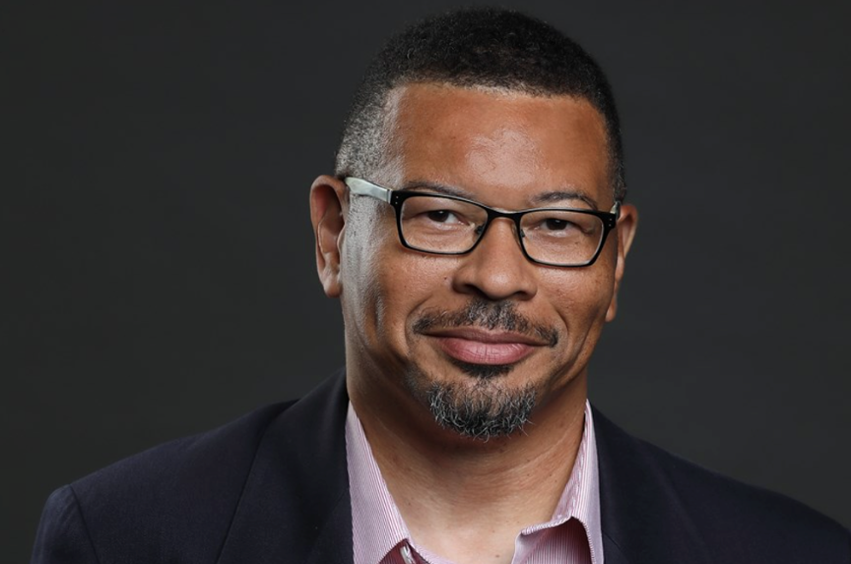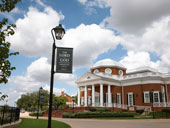The Gospel Possibility in the Face of Race
This article is over six months old and may reference former titles for DBU faculty or staff, discontinued programs, or other details that have since changed. If you have any questions, please contact us at news@dbu.edu, or (214) 333-5172.

DBU welcomed Dr. Vincent Bacote to speak in a recent Friday Symposium where he gave a focused lecture on the topic of race and the evangelical movement. Dr. Bacote is a Professor of Theology and the Director of the Center for Applied Christian Ethics at Wheaton College in Wheaton, Illinois. He is a seasoned author, columnist, lecturer, podcaster, and follower of Christ.
"Racism is one way that people violate the two greatest commandments: to love God with all our heart, soul, mind, and strength and to love our neighbors. It violates the former by elevating the characteristics of a particular group and making it an object of worship or an idol. It violates the latter because it elevates self over others," Dr. Bacote shares. "Racism is a sin and Christians ought to care about it."
In his book "Reckoning with Race," Dr. Bacote explains that there are four main stages of how individuals in the evangelical space deal with differing opinions and beliefs.
- The Delight Phase: A renewing time of diving deep into the Word and living in community with others who also love Jesus. This could be likened to "the honeymoon phase" of a new marriage.
- The Dissonance Phase: A time when disagreements in beliefs begin to cause rifts in a community of believers. We often experience dissonance when we disagree with or don't know how to respond to those around us.
- The Distress Phase: A time when more than one area of dissonance comes to light and the spring between believers grows tighter and tighter. The body may enter into distress and confusion.
- The Decision Phase: A time when many people will ask, "should I stay where I am or should I leave?"
Dr. Bacote remained in the faith when faced with discord revolving around the topic of race but knew that something had to change. Because of the continual impact racism has on our culture and society, the Church must become contentious in not only sharing the Gospel of Jesus Christ but also developing Christ-like habits that will allow us to do so with grace and without hypocrisy. Dr. Bacote has developed three practices that encourage brothers and sisters of the faith to deliver what he has coined as "better Good News."
1. Develop a Perpetually Uneasy Conscience
"It is hard to pray 'Jesus search me' or 'Jesus change me' if your conscience is at ease all the time," Dr. Bacote says. "We have to be willing to be disturbed by God at any moment for the purpose of becoming what He desires us to become. We should always be asking, 'is there something here for me to see?,' 'is there something for me to learn from?,' and 'is there ignorance in me that I am unaware of?"
We, as evangelicals, should feel uneasy when we watch the problems of the world around us remain unattended to. It is difficult for Jesus to change our hearts when we place stipulations on the areas in which we allow Him to spark change. Because of this, we must pray for a mind and heart that are always willing to be renewed.
2. Aspire to Have Good News Dispositions
As followers of Christ, we should desire to learn more about the Word of God every day. When we dive deep into the Bible, we begin to develop a heart that breaks for the things that break our Lord's heart.
3. Spend Time Before the Cross to Greater Grasp It's Meaning
The Good News is made more remarkable by recognizing the depravity caused by sin. "Why is the Gospel good news?," Dr. Bacote asks. "Because I talk about and recognize the bad news first."
"I want to be a part of showing my Kingdom commitments by tending to and seeking to address things that are in opposition to the Kingdom of God. Certainly, the complexity of everything that has happened and is happening with race is part of this."
In conclusion, Dr. Bacote explains that when evangelicals lead by example in what we say and what we do, we can offer the Good News to all, just as Jesus intended. We can honor the Lord by showing others "better Good News." When we recognize how our Savior changes everything and rules over the many problems we face both in the Church and outside the Church, "the Gospel of Jesus Christ is better news than anyone could have ever imagined."








